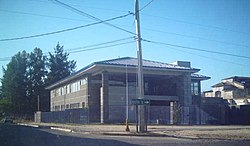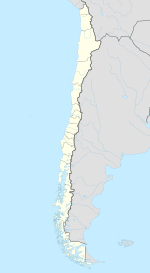Molina, Chile
| Molina | |||||
|---|---|---|---|---|---|
| City and Commune | |||||

Courthouse
|
|||||
|
|||||
| Coordinates (city): 35°06′52″S 71°16′57″W / 35.11444°S 71.28250°WCoordinates: 35°06′52″S 71°16′57″W / 35.11444°S 71.28250°W | |||||
| Country | Chile | ||||
| Region | Maule | ||||
| Province | Curicó | ||||
| Founded | 1834 | ||||
| Government | |||||
| • Type | Municipality | ||||
| • Alcalde | Priscilla Castillo Gerli (UDI) | ||||
| Area | |||||
| • Total | 1,551.6 km2 (599.1 sq mi) | ||||
| Elevation | 273 m (896 ft) | ||||
| Population (2012 Census) | |||||
| • Total | 40,329 | ||||
| • Density | 26/km2 (67/sq mi) | ||||
| • Urban | 28,232 | ||||
| • Rural | 10,289 | ||||
| Demonym(s) | Molinense | ||||
| Sex | |||||
| • Men | 19,392 | ||||
| • Women | 19,129 | ||||
| Time zone | CLT (UTC-4) | ||||
| • Summer (DST) | CLST (UTC-3) | ||||
| Area code(s) | 56 + 75 | ||||
| Website | Official website (Spanish) | ||||
Molina is a Chilean city and commune in Curicó Province, Maule Region. Molina is named after Chilean Jesuit Juan Ignacio Molina.
According to the 2002 census of the National Statistics Institute, Molina spans an area of 1,551.6 km2 (599 sq mi) and has 38,521 inhabitants (19,392 men and 19,129 women). Of these, 28,232 (73.3%) lived in urban areas and 10,289 (26.7%) in rural areas. The population grew by 8% (2,847 persons) between the 1992 and 2002 censuses.
As a commune, Molina is a third-level administrative division of Chile administered by a municipal council, headed by an alcalde who is directly elected every four years. The 2008-2012 alcalde is Mirtha Segura Ovalle (UDI).
Within the electoral divisions of Chile, Molina is represented in the Chamber of Deputies by Roberto León (PDC) and Celso Morales (UDI) as part of the 36th electoral district, (together with Curicó, Teno, Romeral, Sagrada Familia, Hualañé, Licantén, Vichuquén and Rauco). The commune is represented in the Senate by Juan Antonio Coloma Correa (UDI) and Andrés Zaldívar Larraín (PDC) as part of the 10th senatorial constituency (Maule-North).
...
Wikipedia



